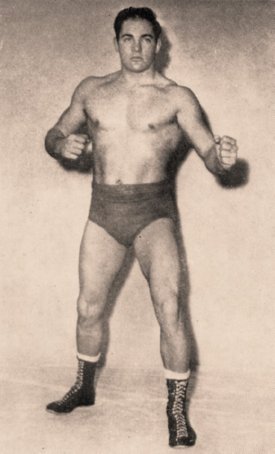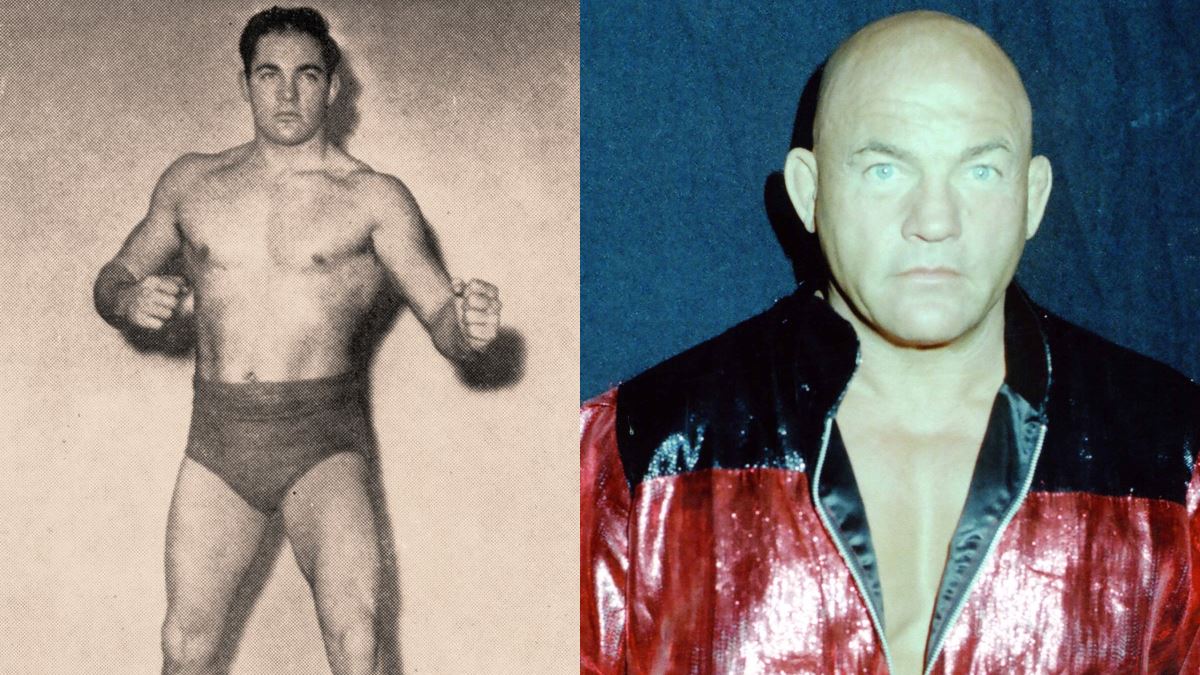Legendary Winnipeg grappler Gordon Nelson died Monday morning from heart failure and pneumonia. He was 82. Nelson leaves behind a legacy of pure toughness nearly unparalleled respect.
No less than former NWA World champion Terry Funk thought so. During his acceptance speech in April 2005 for the Iron Mike Award at the Cauliflower Alley Club, the highest honor in pro wrestling, Funk singled out Nelson as someone who had a major influence on him. Nelson, who worked as Mr. Wrestling in the Amarillo territory, “beat the hell out a lot people through the years, and was just a tough guy.”

A young Gordon Nelson. Photo courtesy Yasutoshi Ishikawa
Winnipeg was a wrestling hotbed in the 1950s. Nelson, who was born March 27, 1930, was Manitoba amateur champion as a lightweight in 1951. In April 1952, Nelson competed in the Manitoba amateur championships, and, despite losing to Vern Plett, Nelson was honored for “being the most outstanding performer of the year in officials’ eyes.” He was lightheavyweight champion in 1954 and 1955.
Nelson was the Olympic representative in freestyle for his weightclass in both 1952 and 1956, but a lack of funds prevented the Canadian Olympic team from taking freestyle wrestlers to the Games in Helsinki and Melbourne. Needing to find his own sponsor, Nelson did not go.
In 1956, after the second Olympic disappointment, Nelson turned to Winnipeg’s Albert ‘Ole’ Olsen, who had just married his cousin Joanie, for training in the pro aspects.
“He was tough competition, but he started me off and everything,” Nelson said in 2008, after Olsen’s passing. “He was pretty strict.”
The 5-foot-11, 220-pound Nelson sent a letter to Jack Dale of Martin Promotions in England, and was invited overseas to debut as a pro.
Years after Nelson had returned to North America — he would spent a dozen years in the UK — famed British announcer Kent Walton still raved about the “muscle-packed power-house” in his autobiography, This Grappling Game
“After a title-studded career as an amateur in Canada he turned pro and came to England. He has returned to North America though, and we haven’t seen him on the screen recently,” lamented Walton. “At 15 stone 2 pounds his strength is fabulous. I have seen him, from a lying position, lift a man a stone and a half heavier with his left arm alone. From the ground to a standing-up position, that is, and still have the man on his left shoulder. Sounds impossible? I have seen it done. Not once but several times. Only by Gordon Nelson, though.”
Nelson worked many territories, including New York, North Carolina, Oklahoma for Leroy McGuirk, the AWA, the Gulf Coast, Amarillo, Florida, Georgia, as well as Puerto Rico, Japan and Australia. In Los Angeles, he was managed by Ripper Collins. “He could get heat all right,” Nelson said in 2006. “He’d tell the people they looked fat, and people used to hate somebody like that.”
There was a distinct difference between England — where he was known as “The Outlaw” — and the U.S., Nelson said. “England [wrestling] is like night and day from over here. I almost had to learn all over again over here.”
Promoter Francis Fleser hyped Nelson for an appearance in Detroit in 1969: “He knows his wrestling and utilizes many holds with great accuracy. You will immediately see that he is a top man. I think that he will prove to be a real threat for many wrestlers in this area.”
The “Mr. Wrestling” name, given to him in Amarillo by Dory Funk Sr., was more than just a gimmick. Promoters often relied on Nelson’s legitimate skills as a grappler — a “shooter” in wrestling terms — to scare off anyone who dared doubt that the sport was not on the up-and-up.
Bill Watts wrote about what he saw in his autobiography, The Cowboy And the Cross:
One time a mark in Florida wanted to try the wrestlers on for size, so [Florida promoter] Eddie [Graham] let him get into the ring with Gordon. As Gordon was about to get into the ring, Eddie yelled, ‘Kill him, Gordon!’
They locked up, and Gordon guzzled him almost instantly. then he locked in the sugar hold. The guy was passing out and started gurgling.
Eddie, watching, said, ‘Is he going out?’
Gordon said, ‘Well, yeah.’
‘Well, let him go, Gordon!’
‘But Eddie,’ Gordon said, calm as could be, ‘you said to kill him.’
Steve Nelson, the oldest of his two sons, said that that tough guy persona is what will be most remembered about his father.
“I believe his legacy will be his great amateur wrestling background and doing real shoot matches for promoters in territories against marks in private gyms and also the matches he used to wrestle against fans in the Amarillo territory for Dory Funk Sr.,” he said. “If you could last 10 minutes with him Funk would pay them $1000. He loved wrestling and was even offered jobs to book for Japan but wasn’t interested because he only wanted to wrestle. He never took himself real serious and was very humble even with all his accomplishments. I never heard him brag in my entire life and always respected him for that.”
Moose Morowski, a fellow Winnipeg boy who spent a lot of time in Amarillo, witnessed one of the challenges to Nelson. “This one guy challenged him, and he was maybe about 190 pounds. You could see that he knew what he was doing,” said Morowski. “It took Gordie about eight, nine minutes before he got him. When he got him, the guy just panicked and went running out of the ring and wouldn’t go back, because he knew that Gordie knew too much.”
Nick Kozak, who homesteaded and promoted in the Amarillo territory, chuckled that Nelson was quiet and dangerous. “You could say he’s a little stiff.”
Kozak looks back fondly on their friendship. “We had a lot of fun together. He loved to barbecue. We’d stop at a hotel in Odessa or El Paso, where they would give the boys a rate, especially if we got there after 12 o’clock, it would be two-for-one. Boy, as soon as you got settled, Gordon would have the barbecue out, barbecuing chicken. He loved to do that. He was a good chef.”
When Jim Crockett Promotions bought the Florida promotion and rolled it into his growing NWA (WCW) promotion, Nelson was part of the package. He hauled the ring for WCW for 11 years until the company was sold to the WWF. “It was a real good job. It was easy and I liked the travelling,” he said in 2003.
@wuvNelson suffered a stroke during his final years with WCW, and was forced to take time off. He lived with his son, Steve, in Amarillo. Like his father, Steve had a reputation as a great amateur wrestler and shoot fighter, and runs the wrestling program at Palo Duro High School.
Steve Nelson, Gordon Nelson Jr., and Gordon Nelson Sr. Photo courtesy Gordon Nelson Jr.
For the last number of years, Nelson suffered a number of age-related ailments, including a failing memory.
Steve Nelson shared his last memory of his father, who passed on Monday at 5:30 a.m.
“I want people to know that even his last night alive when he was gasping for breath he still looked at me and said, ‘How have you been doing?’ I will never forget him saying that while he was dying. My dad was a class act and liked by everyone.”
The memorial for “Mr. Wrestling” Gordon Nelson will be January 9 at 7 p.m. at the Cox funeral home in Amarillo, Texas.
Gordon Nelson is survived by his two sons, Gordon Nelson Jr., and Steve Nelson. He was married to second-generation woman wrestler Marie Laverne.
RELATED LINKS
- Jan 7, 2013: Marie Laverne shares her memories of Gordon Nelson
- May 21, 2003: Gord Nelson: The toughest of the tough

